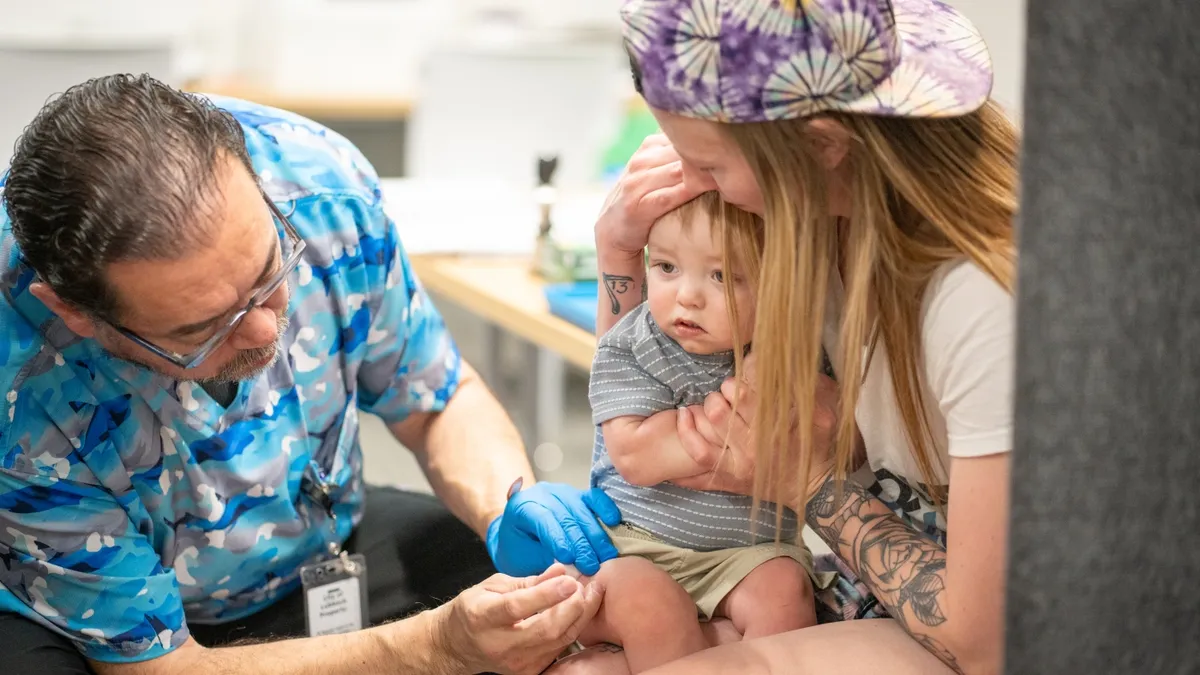
In a troubling turn of events, more than a dozen vaccination clinics in Pima County, Arizona, have been abruptly canceled, mirroring similar disruptions across various states including Texas, Minnesota, and Washington. This widespread cancellation of clinics is a direct result of the federal Centers for Disease Control and Prevention (CDC) unexpectedly cutting $11.4 billion in COVID-related funding for state and local health departments in late March. The ramifications of these cuts are being felt nationwide, as efforts to ensure children are up to date on their vaccinations suffer significant setbacks.
In response to the federal funding cuts, a group of state Attorneys General filed a lawsuit, which led to a federal judge temporarily blocking the cuts in some areas, including Arizona. However, many organizations that rely on these funds have begun to operate under the assumption that the funding is permanently lost. This uncertainty raises significant public health concerns, particularly as the nation is witnessing a resurgence of measles cases and an increase in vaccine hesitancy.
Former U.S. Surgeon General Jerome Adams expressed his concerns about the accessibility of vaccines for vulnerable populations, emphasizing that without high vaccination rates, these communities are at risk of preventable harm. The Department of Health and Human Services (HHS), which oversees the CDC, has stated that the funding cuts were made because the COVID-19 pandemic is considered over. HHS spokesperson Vianca Rodriguez Feliciano remarked that taxpayer dollars should not be wasted responding to a pandemic that the public has moved on from.
Despite the cessation of COVID-related funds, many clinics have utilized this money to combat other preventable diseases, including the flu, mpox, and measles. A current outbreak of measles in Texas has resulted in over 500 cases, 57 hospitalizations, and the tragic deaths of two school-aged children. In Pima County, local health officials discovered that one of their vaccination programs would end prematurely due to the loss of $1 million in federal grant money, forcing the cancellation of around 20 scheduled vaccination events. Theresa Cullen, the director of the county health department, emphasized the detrimental impact this will have on rural areas within the county, where access to health clinics and pharmacies is limited.
Cullen noted that vaccination events serve a dual purpose: they not only provide essential immunizations but also offer health education and foster trust between communities and public health systems. Although county leaders were aware that funding would expire at the end of June, they had been actively engaging with local communities to find a way to sustain these vital programs. Unfortunately, the abrupt cuts have left them unable to honor their commitments.
The full impact of the CDC funding cuts remains to be seen, but estimates from the California Department of Public Health suggest that grant terminations could lead to a $840 million loss in federal funding for the state. This includes $330 million that was directed toward virus monitoring, testing, childhood vaccines, and addressing health disparities. Director Erica Pan of the California Department of Public Health stated that they are currently evaluating the ramifications of these actions.
In Washoe County, Nevada, the unexpected funding cuts have resulted in the loss of two contract staff members responsible for organizing vaccination events, including essential back-to-school immunizations for diseases like measles. Lisa Lottritz, division director for community and clinical health services at Northern Nevada Public Health, lamented that the core team is now unable to manage multiple vaccination events due to reduced staffing.
Moreover, a scheduled conference in Missouri focused on strengthening immunization efforts was canceled, leading to layoffs within the Missouri Immunization Coalition. The coalition's president, Lynelle Phillips, expressed outrage over the timing of these cuts amid a resurgence of measles cases. Dana Eby, a health department representative in New Madrid County, highlighted the importance of community efforts in achieving high vaccination rates, noting that over 98% of kindergartners in their region received the measles, mumps, and rubella vaccine.
Former Surgeon General Adams, who was slated to speak at the Missouri event, emphasized the critical need for community collaboration in promoting vaccinations. He warned that the decline in vaccination rates could lead to the resurgence of diseases like measles and whooping cough, which could have dire consequences for public health.
As the nation grapples with these funding cuts and the consequent impact on vaccination efforts, it is incumbent upon communities, health officials, and policymakers to work together to ensure that essential immunization programs are maintained. The health and safety of our children and communities depend on it.